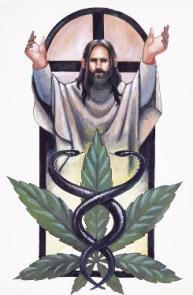Was Jesus a Stoner? is the mischievous title of an article about the use of cannabis in ancient Judaism in next month's High Times, a pro-cannabis magazine. Its author, Chris Bennett, likes to shock. He is the host of Burning Shiva, a show on Canada's Pot-TV, and an advocate for the medical use and decriminalisation of marijuana. Was there a whiff of cannabis about Jesus?
Claims of drug use by biblical figures surprisingly have susbtance,

says Professor Carl RuckBennett first looked at the use of drugs in religion two years ago in his book Sex, Drugs, Violence, and the Bible. He postulates that Jesus's ministry was fuelled by mind-altering substances, that he may have used cannabis-based oils to heal eye and skin diseases and that his very name - Christ - derives from being anointed with cannabis-enriched oil.
His politics and television career might make it tempting to dismiss him but what Bennett says makes perfect sense. Over the centuries drugs have been used by virtually all religions. Why not Christianity?
In ancient times cannabis was widely cultivated throughout the Middle East. It grows like a weed and provides nourishing seed, which is also a good source of fibre used to make rope.
People certainly knew of its pleasurable effects; it would have been impossible to harvest it without becoming ecstatic as the drug would be absorbed through the skin. And as long ago as 1935 a Slovakian linguist identified the plant known as "fragrant cane" in the English Bible as flowering cannabis, a link since accepted by some Jewish authorities.
Ancient people were fascinated by herbs and their healing powers and knew much more about them than we do; at least about mixing herbs to release their potency.
Ancient wines were always fortified, like the "strong wine" of the Old Testament, with herbal additives: opium, datura, belladonna, mandrake and henbane. Common incenses, such as myrrh, ambergris and frankincense are psychotropic; the easy availability and long tradition of cannabis use would have seen it included in the mixtures. Modern medicine has looked into using cannabis as a pain reliever and in treating multiple sclerosis. It may well be that ancient people knew, or believed, that cannabis had healing power.
Much of their knowledge, passed down through an oral tradition, has been lost and to some extent it is the modern prejudice against drugs that has stopped us looking for it. Revulsion against drugs and the hippie culture even led to the term "entheogen" being coined to describe a psychotropic substance used in religious rituals.
Entheogen comes from the Greek entheos (meaning "god-inspired within") and the word is now commonly employed in English and European languages to discuss sacramental foods used by shamans (mystic or visionary priests) to achieve spiritual ecstasy.
So what of the early Christians? At the time they were evolving, they had to compete with other religions of the Roman empire. The strongest of those was Mithraism, imported from Persia, which exists today as Zoroastrianism.
Its sacrament, Haoma, was virtually identical to what we know of soma, in Brahmanism. Worshipped as a god, soma was a strange plant without leaves or roots that needed little light and induced religious ecstasy. It was most likely amanita muscaria: a magic mushroom. In ancient Rome sharing the Haoma cemented the bond of brotherhood of emperors, bureaucrats and soldiers. Pagan Greek celebrations at the sanctuary of Eleusis, meanwhile, included a visionary experience for a crowd of 1,000 people, from drinking a potion made from a fungus that grows on wheat and produces an effect similar to LSD.
So, did Jesus use cannabis? I think so. The word Christ does mean "the anointed one" and Bennett contends that Christ was anointed with chrism, a cannabis-based oil, that caused his spiritual visions. The ancient recipe for this oil, recorded in Exodus, included over 9lb of flowering cannabis tops (known as kaneh-bosem in Hebrew), extracted into a hin (about 11